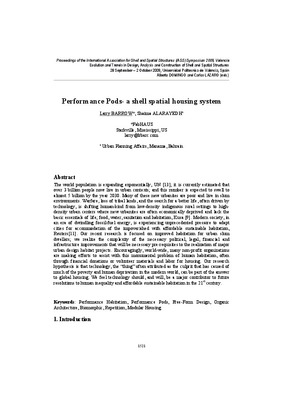JavaScript is disabled for your browser. Some features of this site may not work without it.
Buscar en RiuNet
Listar
Mi cuenta
Estadísticas
Ayuda RiuNet
Admin. UPV
Performance Pods - a shell spatial housing system
Mostrar el registro completo del ítem
Barrow, L.; Alarayedh, S. (2010). Performance Pods - a shell spatial housing system. Editorial Universitat Politècnica de València. http://hdl.handle.net/10251/7152
Por favor, use este identificador para citar o enlazar este ítem: http://hdl.handle.net/10251/7152
Ficheros en el ítem
Metadatos del ítem
| Título: | Performance Pods - a shell spatial housing system | |
| Autor: | BARROW, Larry ALARAYEDH, Shaima | |
| Editor: | ||
| Fecha difusión: |
|
|
| Resumen: |
The world population is expanding exponentially, UN [13]; it is currently estimated that
over 3 billion people now live in urban contexts; and this number is expected to swell to
almost 5 billion by the year 2030. Many ...[+]
|
|
| Palabras clave: |
|
|
| Derechos de uso: | Reserva de todos los derechos | |
| ISBN: |
|
|
| Fuente: |
|
|
| Editorial: |
|
|
| Título del congreso: |
|
|
| Lugar del congreso: |
|
|
| Fecha congreso: |
|
|
| Descripción: |
|
|
| Tipo: |
|







